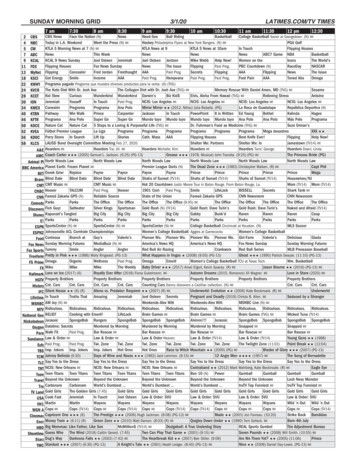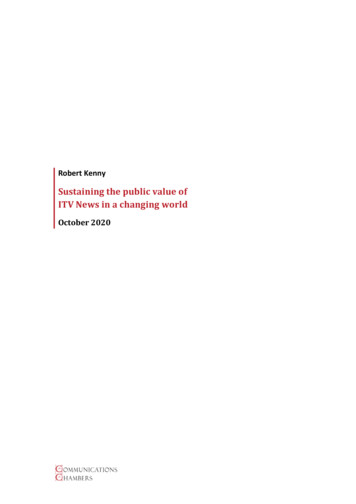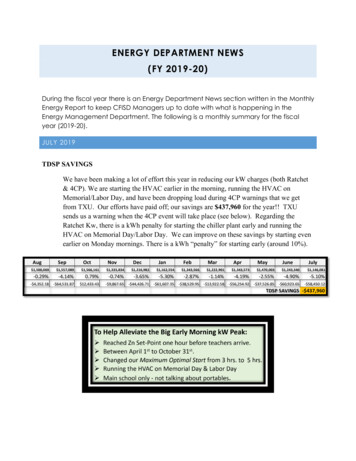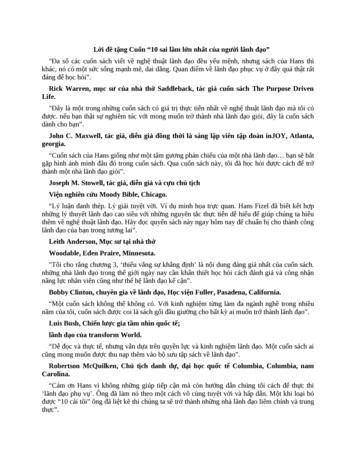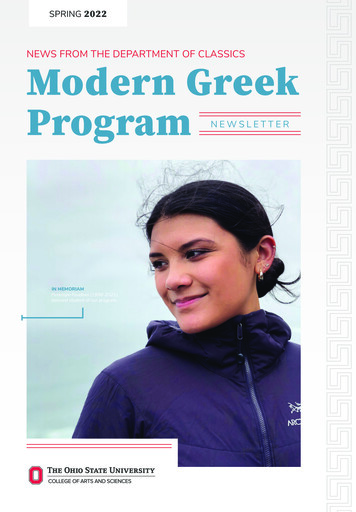
Transcription
SPRING 2022NEWS FROM THE DEPARTMENT OF CLASSICSModern GreekProgramNEWSLETTERIN MEMORIAMPenelope Foudeas (1998-2021),beloved student of our program.
TABLE OFCONTENTSA MESSAGE FROMGeorgios AnagnostouDirector of the Modern Greek ProgramThe Ohio State Universitypg 2A Message from the Directorpg 3Teaching during COVID-19pg 4pg 5pg 7The Establishment of theMiltiadis Marinakis ChairThe Endowment of Modern GreekProfessorshipLeontis Lecture 2021Lecture by Paschalis Nikolaoupg 8On why the Grubhub Robots don’tUnderstand Novelspg 9Graduating StudentsStudent Awardspg 10Dear Friends of the Ohio Greek-American Community,In March 25, 2020, our modern Greek Program celebrated alandmark event in its history, the establishment of The MiltiadisMarinakis Endowed Professorship of Modern Greek Languageand Culture.The Endowment was created by The Board of Trustees ofThe Ohio State University, with major gifts from the Columbusbased Ohio Hellenic Paideia and Evangelos Marinakis, afterwhose father it is named.The Modern Greek Program at Ohio State expresses itsappreciation to Ohio’s Greek Americans, and the Greek OlympicSociety in Columbus, for their unwavering support. We extendour heart-felt appreciation to the Capital Shipping Companywhose generous Gift was a catalyst for the success of theproject. We are grateful to the Paideia Fundraising committeefor its tireless work and leadership that made this EndowedProfessorship a reality. We thank you for your trust in us andthe investment you are making to the Program.In the midst of the challenges the Ohio State community facedduring 2020 and 2021 due to COVID-19, we have several positivenews to report. Our enrollments have been robust, and thefaculty continues its contributions to scholarship in publicationsand academic webinars. The profile of our activities betweenAutumn 2020 and Spring 2021 is featured below.We dedicate this issue to our beloved student Penelope Foudeaswho tragically lost her life in 2021.Faculty NewsSincerely,In MemoriamGeorgios Anagnostou2
TEACHING DURINGCOVID-19THE ESTABLISHMENT OF THEStudents (from left toright): Romel Portis,Andrew Manokas andAlexander Wheelhouse.Like most departments at Ohio State, the Departmentof Classics, home of the Modern Greek Program,offered many of its classes online during the last twoacademic years. While all our language courses weretaught in person, offerings in culture, literature andethnography were done via Zoom. We confronted manyof the challenges everyone else faced in the domain ofeducation last year — trying to provide a meaningfulexperience to our students whom we saw either behindmasks or on the screen.Miltiadis Marinakis Chair of ModernGreek Studies at Ohio StateIn order to celebrate the installation of YiorgosAnagnostou as the holder of the Miltiadis MarinakisChair of Modern Greek Studies, Capital Link,an international firm, organized a webinar ofdistinguished Greek Americans to consider the role ofculture in the preservation of Greek American identity.The event opened with greetings from His Eminence,Archbishop Elpidophoros of America, AlexandraPapadopoulou, Greek ambassador to the United States,and Evangelos Marinakis, chairman of Capital Maritimeand Trading Corporation.The year brought with it a time of celebration anda time of sorrow.Anagnostou then gave a lecture on the role ofphilanthropy in the United States and specifically thetireless effort of the Greek American community ofcentral Ohio to collect most of the funds that led to theestablishment of the Marinakis Chair. (We append thelecture below.)Here are the courses we taught:AUTUMN 2020:MG 1001 Elementary Modern Greek,taught by Christopher BrownFinally, Arts and Sciences Distinguished ProfessorGregory Jusdanis introduced and moderated thediscussion among: John Calamos, founder and globalCIO of Calamos Investments and chairman of theNational Hellenic Museum; Drake Behrakis of theBehrakis Foundation and board chairman of theNational Hellenic Society; Robert Buhler, chairman ofthe Panhellenic Scholarship Foundation, and presidentand CEO of Open Pantry Food Marts of Wisconsin;George G. Horiates, supreme president order of AHEPA;Artemis Leontis, C. P. Cavafy Chair of Modern Greekand Comparative Literature, University of Michigan;and Nick Larigakis, president and CEO, AmericanHellenic Institute (AHI).The discussion was attended by close to 300 guests fromaround the world.MG 1103 Intermediate Modern Greek,taught by Christopher BrownMG 4002 Advanced Modern Greek,taught by Christopher BrownMG 3710 Modern Greek Literature in Translation,taught by Gregory JusdanisMG 2100 Greece in Film,taught by Yiorgos AnagnostouMG 2680 Folklore of Contemporary Greece,taught by Yiorgos AnagnostouSPRING 2021:MG 1102 Intermediate Modern Greek,taught by Christopher BrownMG 4001 Advanced Modern Greek,taught by Christopher BrownMG 2240 Travels to Greece,taught by Gregory JusdanisMG 2000 Athens: The Modern City,taught by Yiorgos AnagnostouMG 2367 Issues in Greek American Society,taught by Yiorgos AnagnostouMG 5000 Modern Greek Language and Literature,taught by Christopher Brown3A student wears a maskwhile working on herlaptop.4
Three graduates reunite inAthens (from left to right):Stavroula Pabst (2017),Emily Pandis (2018) andAnna-Maria Thalassinos (2019).GIFTS AND REMEMBERINGThe Endowment of the Modern GreekProfessorshipYour Eminence, your excellency/dear ambassador,ladies and gentlemen, dear friends,It is an honor for me to participate in this conversation,and I thank Capital Link for organizing the webinar.This is a day for celebration, a day to recognize thegifts our program has received throughout its 40-yearhistory. It is also a day for memorializing. Gifts in theGreek Orthodox tradition are connected with memory.One offers a gift and expects to be remembered throughthis giving. Gifts connect the past, the present and thefuture.Today, it is a fitting occasion to recall with appreciationthe gifts we have received from the Greek Americancommunity in Columbus. It was in 1975 when theProject Paideia began fundraising for the establishmentof a Modern Greek Program at Ohio State. And it was in2015 when the Ohio Hellenic Paideia — a dynamic groupof local leaders — helped us launch the fundraising,which, five years later in 2020, concluded successfullywith the establishment of The Miltiadis MarinakisEndowed Professorship in Greek Language.In this effort it was a crucial gift by EvangelosMarinakis that made this endowment possible. Theendowment honors the memory of his late father.Gifts generate connections, and gifts have enabled ourpresence at The Ohio State University, and now thisendowment assures our presence in this institution inperpetuity. As part of Ohio State, we have connectedwith peers, students and citizens from all over theworld, including of course, the United States. The giftswe have received have linked us with the local GreekAmerican community, but also the broader GreekAmerican, American and Greek public.These gifts have generated a network of globalinterconnections. Gifts create relations of reciprocity.In this respect, the story of our program is a story notonly of gifts but also counter-gifts. It is a story of giftsreceived, and gifts given back. We have given back toOhio State by advancing its mission. We have workedrelentlessly to bring international distinction to thisinstitution. Our program is respected internationally forthe quality of its scholarship. I would like to recognizemy colleague Gregory Jusdanis, and my predecessors,Professor Vassilis Lambropoulos and ProfessorArtemis Leontis for their enormous contribution to thisendeavor. Also Dr. Christopher Brown for his devotionto teaching the Greek language.This commitment and devotion is part of our reciprocalconnection with the university. We recognize that for 40years Ohio State has supported two full-time faculty anda lecturer in Modern Greek. Ohio State is one of the fewinstitutions in the world that supports a full-time facultyworking on Greek American studies. For this we expressour appreciation.To Greek America we offer a vital educational resource.We share our knowledge with students; we organizesummer study abroad in Greece and write for localcommunity magazines; we maintain blogs as wellpublishing in the Greek American and Greek media.Our conviction is that Greek American educationenriches personal lives and contributes to the civicmission of the polity.To our home, the United States, as well as the world, weoffer new ideas, new ways of thinking about modernGreece and Greek America. We undermine stereotypesand simplistic ways of talking about Greek identity. Thetitle of this webinar is ‘Culture and Education amongGreek Americans.’ Our conversation today takes placein the midst of a new historical development: GreekAmerica is diversifying and it does so rapidly.We do not have a full grasp of its various directions. Butwe know this; in the words of a Greek American youngprofessional: ‘Because “Hellenism” is such an intricateconception and means different things to differentpeople, it should be presented as a multifaceted entity.’5The diversification of Greek America means that thereis a variety of ways defining Greek American identity.New needs, new interests and new ideas are emerging,presenting challenges and opportunities. Scholars inGreek American studies have just started developingan initial understanding of this emerging landscape.We know for example that Greek American high schoolstudents — the so-called Generation Z — are increasinglyinterested in issues regarding civic leadership,governance, inclusion, the environment, inequality,racial justice.Last week, I spent time evaluating applicationsfor the Panhellenic Foundation Scholarship. I wasassigned a pool of 25 applicants. I noticed that severalapplicants envision a professional career in writing,film, literature, storytelling, environmental policy,journalism, public policy, ethics, citizenship. If thissample is indicative of a broader trend, then we arewitnessing a historical turn: There is a demographicgroup with increasing interest in the humanities andsocial sciences. It is equipped to empower the civic andcultural life of Greek America and the country.In this shifting landscape, Modern Greek Programsin the United States are positioned to contributeto these developments. We offer a resource whereindividuals can expand their understanding of Greekculture beyond what they know from their families andcommunities. In the words of a former student, modernGreek studies ‘provided me a new set of spaces whereI could make meaningful connections to aspects ofGreek identity and culture that I had not known before.’We create platforms to share ideas, personal essays,poetry, history and analysis of emerging developmentsin the interest of giving voice to marginalized identities,identities which have been neglected, new initiativesand civic visions.We do so in the spirit of democratic inclusion. ModernGreek programs produce responsible knowledgecontributing to Greek American self-understanding.They contribute to the cultural and civic vitality ofGreek America and, in turn, the United States. In thenetwork of gifts that have enabled our presence in theworld of education, these are the counter-gifts we offerin return.6
Leontis Lecture2021Since all large-scale activities were cancelled by theuniversity, we held our annual Leontis Lecture online.In order to celebrate the bicentenary of the GreekWar of Independence against the Ottoman Empire of1821, we invited Professor Sakis Gekas, a distinguishedhistorian and Hellenic Heritage Foundation Chair inModern Greek History at York University in Toronto, tooffer a talk on March 24, 2021. In his lecture, “Islands onFire: Fighters, Pirates, Slaves in the Greek Revolution,”Gekas considered the role of revolutionaries, pirates,merchants and battleships in determining the course ofthe war. In other words, he shifted the gaze away fromthe “continental” point of view toward a maritime historyof the revolution and focused on piracy, slavery and theplight of refugees to shed light to previously little-knownaspects of the great event.BY GREGORY JUSDANISOn why the Grubhub Robots don’tUnderstand Novels“Hey, I never expected to seeyou here. Could you believe thatstudent on his electric skateboard,careening at almost 20 miles anhour; I was like, stop, before you hitme.”But, to my dismay, nothing ofthe sort happened. Seeminglyunperturbed and indifferent, oneof the robots swiveled to the rightand continued on its destination.Disappointed at this non-event, Itoo resumed my direction to classwhere we often discuss literature’scapacity for vicarious experiences.There was a hidden boon to the lecture. Because it wasonline, it could be seen by people all over the world. As aresult, more than 70 interested listeners saw the lectureand participated in the lively discussion that followed.LECTURE BYPaschalis Nikolaou,Fulbright FellowWe were fortunate to have as our visitor during wintersemester Paschalis Nikolaou, Fulbright Fellow andassistant professor of literary translation at the IonianUniversity on Corfu. On April 7, 2021, Nikolaou gave alecture on the research he was conducting during hisFulbright semester, “Classics Speaking English: SomeRecent Translation, Versions, and Retellings,” in whichhe examined how English-speaking poets and novelistsreturned to the classical tradition for their inspiration.7Amongst the students we welcomedback to campus in September wereYandex robots who “work” forGrubhub. Painted in white, scarletand grey, these machines delivermeals and snacks to eager studentsin the dorms. After a couple ofmonths, we have grown accustomedto these little “creatures” hummingaround campus, able to navigatepavements, grass, crosswalks andabsent-minded human beings.With their red flags flashing,they are impervious to rain (andapparently snow), uncomplainingand seemingly cheerful to workfrom morning till night. They seemso alive.So it was with some amusementthat for the first time I saw twoof the robots suddenly come to ahalt in front of each other. Lost inthought on the way to my Greekliterature class, I too stoppedbeside them, waiting for somethingto happen. For a brief second ofanthropomorphism, I expectedthem to communicate with oneanother or at least to recognize eachother, uttering a greeting, as peoplewould do in similar circumstances:That the robots can bring a chickensandwich to a hungry student doesnot mean, of course, they haveconsciousness or that they carefor us — or each other. We do. Ihad wanted that afternoon forthese two machines to talk to oneanother, to share a story. But it wasI, the human being, who created anarrative about them.I had wanted thatafternoon for thesetwo machines to talkto one another, toshare a story. Butit was I, the humanbeing, who created anarrative about them.project ourselves into the mind ofothers, trying to figure out whatthey are thinking or feeling at anyparticular moment — exactly as Itried to do with the robots.And this is what we had beentrying to do in my class the wholesemester, attempting to enter themind of other individuals by readingshort stories, novels and poems.Indeed, works of literature provideunique opportunities for us to live inalternate worlds and different times.In that afternoon’s class we werereading the great World War I novelLife in the Tomb by Stratis Myrivilis(1890-1969) which deals with thesearing experiences of a soldierfrom Mytilini, Anthony Kostoulas.At the end of our reading, we camenot only to know him but also to lovehim because Myrivilis has createdan authentic character and haddescribed in vivid detail the horrortaking place around Kostoulas aswell as his own reactions to theviolence and killing.At the final discussion, I think,we all felt that we accomplishedsomething great — to share a bit ofour own humanity with each otherthrough the suffering of a fellowhuman being. This is no smallaccomplishment. And I don’t knowif these robots will ever come toknow this feat or if they really care.We do this constantly — try to getinto people’s heads and tell tales.Not only do we have consciousnessbut also what psychologists calltheory of mind, the faculty tounderstand that other people havea consciousness as well, that is,motivations, desires, beliefs andintentions. This means we can8
Graduating StudentsOn a bright afternoon on April 23, we joined ourgraduates to recognize their achievements and sendthem off.Stephanie Duros (modern Greek minor) graduatedwith a degree in industrial and systems engineering.She will be staying at Ohio State for another yearpursuing a Master’s of Science in industrial andsystems engineering, specializing in cognitive systemsengineering.Anna Konstantinidis (modern Greek minor) graduatedwith a major in health sciences and will attend the NewEngland College of Optometry in Boston.Sophia Matts (modern Greek minor) graduated with aBS in environmental public health. She plans to startmedical school in the fall of 2022, taking a gap year topursue a number of experiences, from clinical work totravel.Student AwardsIn MemoriamNick Soulas (modern Greek major) also graduated witha major in neuroscience. He plans to take a gap yearand prepare himself for medical school by pursuing amaster’s degree in physiology from the University ofCincinnati.Antonia Zouridakis(modern Greek minor)graduated with a majorin neuroscience and willeventually pursue a PhD inclinical neuropsychology.Before she applies, sheis taking a gap year ortwo and will work in aneuropsychology researchlab studying cognitiveneurology and Alzheimer’sat Northwestern Universityin Chicago.Faculty AcademicNewsYiorgos Anagnostou published an article in the Journalof Modern Greek Studies and Media, and several essayson Greek American topics. He continues to edit theonline, free-access journal Ergon: Greek/AmericanArts and Letters (ergon.scienzine.com). He gave threewebinar talks, one invited by Stony Brook University,the other by Yale University and the third by HarvardUniversity.The Modern Greek Program is proud to share thenews that our student Yanni Patitsas was namedone of three inaugural PanHellenic LeadershipFellows. Sponsored by The Renaissance Fund, thisnew scholarship program is awarded to “sophomorecollege or university students who best meet a numberof scholarship criteria; this includes displaying serviceand leadership in their community and chosen fieldof study and having roots in the Midwest region.”Congratulation to Yanni for receiving this prestigiousfellowship.9As a student of modern Greek, Penelope excelled in all her courses.Her careful preparation and lively personality were always evident. Shecontinued to the fifth semester, Modern Greek 4002, and earned excellentgrades. With 10 of her peers in the Modern Greek Program, Penelopeparticipated in the THYESPA 2018 summer course in Modern Greek at theUniversity of Athens. Her joyful, considerate and responsible charactercemented friendships and made the experience more enjoyable foreveryone.Penelope Foudeas1998 -2021After graduation, she attended Case Western Reserve, pursuing a master’sdegree in nutrition while working as a patient care advocate at theCleveland Clinic.Her professors in the Modern Greek Program remember her often insightful and always enthusiastic participationin discussion and her bright, cheerful presence in class. She was loved and appreciated by her peers as anunusually kind and considerate person who worked well with other students and was very much a team player. Anenthusiastic member of Sigma Epsilon Phi for three years, she attended meetings with passion and optimism.Penelope’s studies in biology reflected her longstanding interest in the field. In high school, she aspired to a careerin a biomedical field, particularly physiology. Her interest in physiology constituted an important aspect of her lifethat shaped her character.Penelope was a dancer. Having danced ballet since she was 10 years old, Penelope continued ballet at Ohio State’sdistinguished Department of Dance. She did gymnastics in high school, and also danced tap, hip hop, jazz andacrobatic dance. Contemporary dance was her favorite. She taught at the Marjorie Jones School of Dance andcontinued to develop as a dancer. Dance was inseparable from her personality, part of what made her such adisciplined, conscientious, but also fun, expressive, delightful and authentic human being.The faculty and students of the Modern Greek Program at Ohio State as well as her fellow members of SigmaEpsilon Phi will miss Penelope greatly. May her memory be eternal.Christopher Brown has published and given paperson teaching modern Greek to classicists, and hecontinues collaboration with Professor Brian Josephand others on the Herodotos Project, an ethnohistoricaldigital humanities project. The project has wonseveral awards, including an NEH Digital HumanitiesAdvancement Grant, has yielded several recentpublications, and was the subject of an all-day onlineconference in November of 2020.Gregory Jusdanis published an article that studiedthe possible link between a modern Greek and aBrazilian author. In January 2021, he gave a lecturein the Department of Comparative Literature ofStanford University and a seminar in the class on Greekliterature organized by Professor John Ioannidis, poetand epidemiologist. In early March, just before thepandemic forced the closure of all universities, he gavea lecture on an early Venezuelan traveler to Greeceat Louisiana State University in Baton Rouge and aseminar on the biography of the poet, C. P. Cavafy.On April 1, 2021 we mourned the tragic death of our beloved studentPenelope Foudeas. A native of Anchorage, Alaska, Penelope came to OhioState in 2017 to study psychology with a minor in modern Greek studies.Over the course of her undergraduate career, she took a range of classesin modern Greek language and culture and, with her friends, producedseveral memorable videos, including one documenting her father’s journeyto the United States from Greece.The Modern Greek Program mourns the loss of William P. Kaldis,professor emeritus of Greek and Balkan history at Ohio University inAthens, Ohio, and great benefactor of the Modern Greek Program at OhioState. In 2015, Kaldis donated his prized collection of books on modernGreek history to the library of the Ohio State University. Catalogued as theWilliam Peter Kaldis Modern Greek Collection, this gift includes booksKaldis purchased in Greece during the 1950s, some of which cannot befound anywhere else in the United States.Kaldis was a life-long member of the Greek Orthodox Church and served ascantor at services held in Athens, Ohio. A passionate long-distance runner,he participated in 14 marathons and arranged annually for laurel-wreathesto be flown in from Athens, Greece, to Athens, Ohio to crown the winners.William P. Kaldis1923-2021He was interred with full military honors at Arlington National Cemetery,together with his wife Cynthia, on August 27, 2021, in a ceremony attendedby his children and their families.His memory lives on in the countless rare books he donated to the libraryat The Ohio State University.
DEPARTMENT OF CLASSICS414 University Hall230 N. Oval MallColumbus, OH 43210614-292-2744classics.osu.eduLearn more aboutour program online lassics
The Ohio State University, with major gifts from the Columbus-based Ohio Hellenic Paideia and Evangelos Marinakis, after whose father it is named. The Modern Greek Program at Ohio State expresses its appreciation to Ohio's Greek Americans, and the Greek Olympic Society in Columbus, for their unwavering support. We extend



